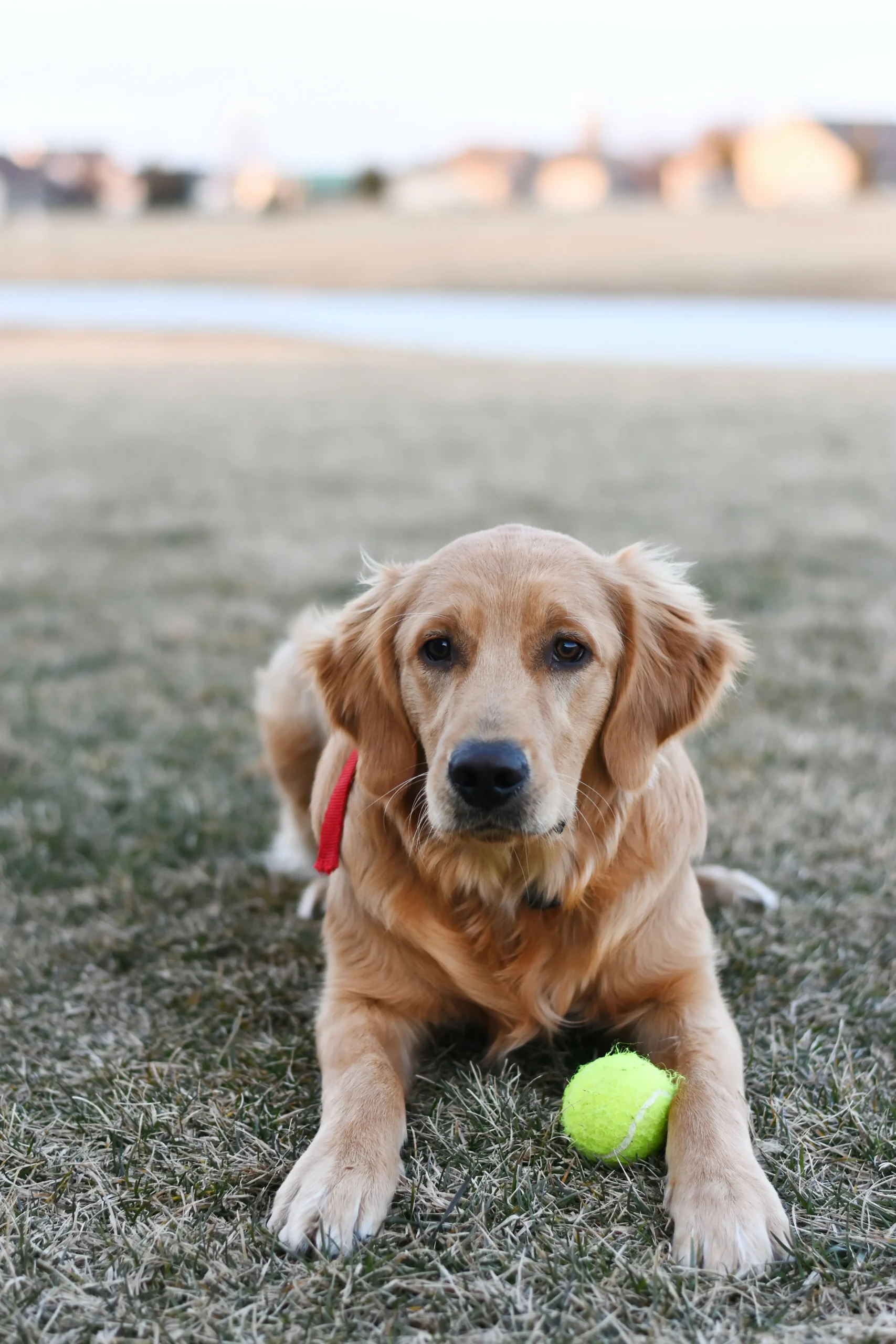Golden Retrievers are one of the most beloved and popular dog breeds in the United States and around the world. Known for their friendly and gentle nature, these dogs make excellent companions for families and individuals alike
History of Golden Retrievers
The history of Golden Retrievers is a fascinating journey that dates back to the 19th century in Scotland. It all began with a passionate dog enthusiast named Sir Dudley Marjoribanks, also known as Lord Tweedmouth. In the mid-1800s, he embarked on a mission to create the ideal hunting dog, one that would excel in retrieving game from both water and land. To achieve this, he crossed a Yellow Retriever (a breed now extinct) with the now-extinct Tweed Water Spaniel.

The result of this carefully planned breeding program was the Golden Retriever we know and love today. These dogs were initially referred to as “Yellow Retrievers,” but the name eventually evolved to “Golden Retrievers” to better reflect their luscious, golden-colored coats.
Golden Retrievers quickly gained popularity not just as hunting companions but also as beloved family pets due to their friendly temperament and versatility. In the early 20th century, they made their way to North America, where they continued to flourish as both working dogs and cherished pets. Their history is a testament to the dedication of breeders like Lord Tweedmouth and their vision for creating an exceptional canine companion.
Golden Retrievers Size
Golden Retrievers are a breed of dog known for their medium to large size and distinctive appearance. Their size is an essential characteristic that makes them popular among dog lovers. Here, we’ll delve into various aspects of the Golden Retriever’s size, including their height, weight, and how they grow from puppies into adult dogs.
Height: Adult Golden Retrievers typically stand between 20 to 24 inches (51 to 61 centimeters) at the shoulder. This measurement is taken from the ground to the highest point of the dog’s withers, which are the top of the shoulder blades. Male Golden Retrievers tend to be slightly taller than females, with the average height for males falling within the upper end of this range.
Weight: Golden Retrievers are known for their sturdy build, and their weight reflects this. Adult Golden Retrievers usually weigh between 55 to 75 pounds (25 to 34 kilograms). Again, males typically fall at the higher end of this weight range, while females tend to be on the lighter side.
Growth Stages: Golden Retrievers go through several growth stages from birth to adulthood. Understanding these stages is crucial for their proper care and development.

- Puppy Stage: Golden Retriever puppies are incredibly adorable and small when they’re born, usually weighing around 14 to 16 ounces (400 to 450 grams). During the first few weeks, they grow rapidly, gaining weight and size. By the time they’re two months old, Golden Retriever puppies are generally around 10 to 12 inches tall at the shoulder and weigh between 15 to 20 pounds.
- Adolescent Stage: As Golden Retrievers continue to grow, they enter their adolescent stage at around six months of age. At this point, they’re still developing and filling out, both in height and weight. They may not have reached their full adult size yet.
- Adult Stage: Golden Retrievers usually reach their full adult size by the time they’re 1 to 1.5 years old. At this stage, they should fall within the average height and weight ranges mentioned earlier. It’s essential to monitor their weight to ensure they maintain a healthy size throughout their adult life.
Variations in Size: While there are breed standards for Golden Retrievers, there can be some natural variations in size due to genetics and breeding. Some individuals may be slightly smaller or larger than the average, but it’s crucial to prioritize their overall health rather than fixate on their exact size. Responsible breeding practices aim to produce dogs that conform to breed standards while also considering their well-being.
Importance of Size: The size of Golden Retrievers plays a role in their suitability as family pets, working dogs, or service animals. Their medium to large build makes them strong and versatile, making them well-suited for various roles.
- Family Pets: Golden Retrievers are known for their gentle and friendly nature, which makes them excellent family pets. Their size is generally manageable for families of all sizes, and their temperament is usually well-suited to interacting with children.
- Working Dogs: Golden Retrievers are often employed as working dogs, particularly in roles such as search and rescue, therapy, and assistance dogs for people with disabilities. Their size and strength allow them to perform tasks effectively.
- Service Animals: Their size, combined with their intelligence and trainability, makes Golden Retrievers suitable for service animal roles. They can assist individuals with a wide range of needs, including guiding the visually impaired or providing emotional support
Nutrition and Diets
Golden Retrievers are known for their friendly disposition, intelligence, and, of course, their beautiful golden coats. To ensure they lead healthy and happy lives, it’s crucial to provide them with a well-balanced diet that meets their nutritional needs. Here’s an overview of the essential aspects of nutrition and diets for Golden Retrievers:

1. High-Quality Dog Food:
The foundation of a Golden Retriever’s diet should be high-quality commercial dog food. Look for brands that list meat, poultry, or fish as the primary ingredient, as this indicates a good protein source. Avoid foods with fillers like corn, wheat, or soy, as these offer minimal nutritional value.
2. Protein:
Protein is a critical component of a Golden Retriever’s diet, as it supports muscle development and overall health. Look for dog food that contains at least 18-22% protein content. Additionally, consider your dog’s activity level when determining protein needs; active dogs may require more protein.
3. Healthy Fats:
Fats provide essential fatty acids that contribute to a shiny coat and overall health. Look for foods with a moderate fat content, around 8-15%. Omega-3 and Omega-6 fatty acids are particularly beneficial for skin and coat health.
4. Carbohydrates:
While dogs don’t require as many carbohydrates as humans, they do benefit from some in their diet. Whole grains like brown rice or oats can provide energy and fiber. However, avoid foods with excessive amounts of carbohydrates, as they can lead to weight gain.
5. Fruits and Vegetables:
Incorporating fruits and vegetables into your Golden Retriever’s diet can provide essential vitamins, minerals, and antioxidants. Safe options include apples, carrots, blueberries, and green beans. These can be added as treats or mixed into their food.
6. Avoid Harmful Foods:
Certain foods can be toxic to dogs, including chocolate, grapes, raisins, onions, garlic, and xylitol (a sugar substitute). Be mindful of what your Golden Retriever has access to and ensure these harmful foods are out of reach.
7. Portion Control:
Golden Retrievers have a tendency to overeat, which can lead to obesity and related health issues. Follow the feeding guidelines on the dog food packaging, and monitor your dog’s weight to adjust portions accordingly. Consult with your veterinarian for personalized recommendations.
8. Fresh Water:
Always provide clean, fresh water for your Golden Retriever. Staying hydrated is crucial for their overall well-being.
9. Life Stage Considerations:
A Golden Retriever’s nutritional needs change throughout their life. Puppies, adults, and senior dogs all require different diets. Ensure you’re feeding an age-appropriate formula and adjust as your dog ages.
10. Special Dietary Requirements:
Some Golden Retrievers may have specific dietary needs due to allergies or sensitivities. If your dog experiences digestive issues or skin problems, consult your veterinarian to determine if a special diet is necessary.
11. Homemade vs. Commercial Diets:
While some pet owners opt for homemade diets, it’s essential to consult with a veterinary nutritionist to ensure the diet is nutritionally balanced. Homemade diets can be challenging to get right and may lead to nutrient deficiencies if not carefully planned.
12. Dietary Supplements:
In most cases, a well-balanced commercial dog food provides all the necessary nutrients. However, your veterinarian may recommend specific supplements, such as joint supplements for older dogs or fish oil for coat health.
13. Weight Management:
Golden Retrievers are prone to obesity, which can lead to various health issues, including joint problems and heart disease. Maintain a healthy weight through portion control, regular exercise, and monitoring your dog’s body condition score.
Training and Intelligence
Golden Retrievers are renowned for their intelligence and trainability, which has made them one of the most popular dog breeds in the world. Their combination of keen intellect and a friendly disposition makes them excellent candidates for various types of training.

1. Intelligence:
Golden Retrievers are known for their high level of intelligence. They consistently rank among the top breeds in terms of problem-solving abilities and learning capacity. This intelligence is a key reason why they excel in a wide range of roles, from family pets to service dogs and search-and-rescue teams.
Their intelligence is not solely based on obedience but also on their ability to understand and adapt to different situations. They have a strong grasp of cause and effect, making them quick learners when it comes to commands and tasks. This intelligence is rooted in their history as hunting dogs, where they needed to work closely with humans to retrieve game.
2. Trainability:
Golden Retrievers are incredibly trainable due to their intelligence and eagerness to please their owners. They thrive on positive reinforcement methods, such as treats and praise, making them highly responsive to training.
Their willingness to learn and adapt to various commands and tasks makes them versatile dogs. Whether you want to teach them basic obedience, advanced tricks, or even specialized skills like therapy work or agility training, Golden Retrievers are up for the challenge.
3. Social Nature:
Golden Retrievers are inherently social dogs, and this aspect of their nature plays a significant role in their trainability. They form strong bonds with their human families and are eager to engage in activities that strengthen these bonds, including training sessions.
Their love for human companionship drives them to seek approval and affection, making them highly motivated to follow commands and complete tasks. This social nature also makes them excellent candidates for roles as therapy dogs, as they enjoy interacting with people and providing comfort and support.
4. Problem-Solving Abilities:
Golden Retrievers possess impressive problem-solving abilities. They can assess situations and adapt their behavior accordingly, often finding creative solutions to challenges they encounter. This problem-solving aptitude is one reason they excel in roles like search-and-rescue dogs, where they need to navigate complex environments and locate missing persons.
When training Golden Retrievers, it’s essential to provide mental stimulation to engage their problem-solving skills fully. Puzzle toys, interactive games, and novel training exercises can keep their minds sharp and prevent boredom.
5. Consistency and Patience:
While Golden Retrievers are highly trainable, it’s crucial to remember that their intelligence and eagerness to please must be met with consistent and patient training techniques. Harsh methods or inconsistency in commands can confuse them or lead to stress, hindering the training process.
Positive reinforcement, rewards, and clear, concise commands are key to successful training with Golden Retrievers. Consistency in training sessions and patience in reinforcing desired behaviors will yield the best results.
6. Specialized Training:
Golden Retrievers excel in specialized training beyond basic obedience. They are often trained as therapy dogs to provide emotional support to individuals in hospitals, schools, and nursing homes. Their gentle nature and adaptability make them ideal for this role.
Furthermore, they are frequently chosen as service dogs to assist individuals with disabilities, including those with visual or mobility impairments. Their intelligence, trainability, and willingness to work closely with humans make them invaluable in this capacity
Health and Lifespan of Golden Retrievers

Golden Retrievers are generally healthy dogs, but like Pomeranian Dog breeds, they can be prone to certain health issues. Some of the common health concerns associated with Golden Retrievers include hip dysplasia, elbow dysplasia, and certain heart and eye conditions.
One of the factors contributing to their overall health is their lifespan, which typically ranges from 10 to 12 years. This lifespan can vary depending on factors such as genetics, diet, exercise, and access to regular veterinary care.
To ensure the best possible health and longevity for your Golden Retriever, it’s crucial to schedule regular check-ups with a veterinarian, maintain a balanced diet, provide regular exercise, and address any health issues promptly.
Conclusion
In conclusion, Golden Retrievers are a remarkable breed with a rich history dating back to 19th-century Scotland. Their ideal size, friendly temperament, and adaptability make them beloved pets and working dogs worldwide. Proper nutrition and training are vital components of their care, considering their intelligence and eagerness to learn.
While they are generally healthy dogs, being aware of potential health concerns and providing regular veterinary care is essential to ensure a long and happy life for your Golden Retriever. These dogs bring joy and companionship to countless families, and their legacy as one of the most popular and cherished breeds continues to grow.



